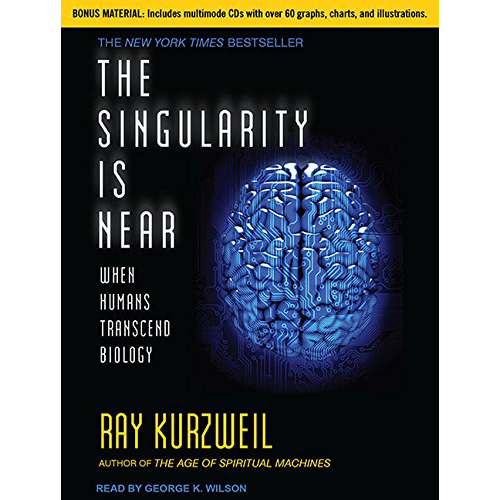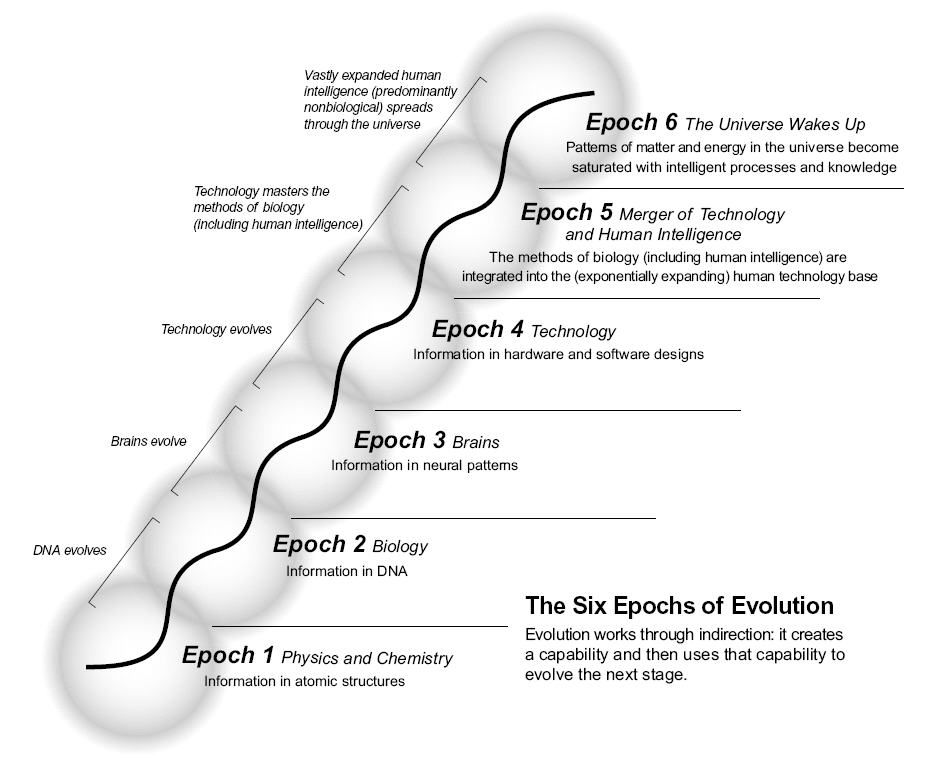Ray Kurzweil
The Singularity Is Near

This book is essentially all about predictions for the
future and where technology is going to take us. Kurzweil goes into a lot of
detail about specific ways the human race is going to advance in decades to
come and how this will drastically change the way we live in the world and as a
species. The main point and title refer to this idea of a ‘Singularity’ which
Kurzweil describes as ‘a future period during which the pace of technological
change will be so rapid, that human life will be irreversibly transformed’. He
touches on a vast array of material from his theories for technological revolution
to topics such as consciousness and achieving the computational capacity of the
brain. He also dedicates a chapter to criticisms and fleshes his ideas out in a
very thorough way. I’d definitely recommend if you feel that might be your kind
of thing.
Kurzweil firstly sets out this idea of there being 6 epochs of evolution which are shown in the graphic below. The Singularity supposedly begins in the fifth epoch in which the merger of human technology with human intelligence will vastly transform our species and significantly ‘overcome the profound limitations of our biological evolution’. Epoch 6 therefore refers to the aftermath of the Singularity. Kurzweil predicts that this is where ‘biological origins in human brains and its technological origins in human ingenuity, will begin to saturate the matter and energy into its midst’. This sort of reminds of those sentient beings in 2001: A Space Odyssey and although it’s easy to dismiss I feel as though a lot of people believe this to be an eventuality for the human species, given that we don’t drive ourselves to extinction before then.
![The Six Epochs of Evolution]()
Kurzweil predicts that this Singularity period should be a reality by approximately the 2040s. His evidence and research to give credibility to this claim surrounds the idea that technology in practically all domains is increasing exponentially and shows no signs of slowing down. He addresses this through the law of accelerating returns and breaks down exponential growth into S-curves. He sees S-curves as the reason people critique exponential growth as at the bottom there is slow growth then rapid growth and then a levelling off, thus completing the S-curve. Kurzweil’s states this as being the ‘life cycle of a paradigm’ and in a broad context a continuous process for technological growth. For example, Kurzweil predicts that when Moore’s Law reaches the end of its S-curve, the exponential growth will continue with ‘three-dimensional molecular computing, which will constitute the sixth paradigm’.
Kurzweil also addresses the issue of ageing which is a prominent topic among technologists. The central idea is that ageing is the worst killer in the world and needs to be seen with a different perspective. Many people see ageing as something that can be solved within the century which is interesting to think about and explore further. David Deutsch talks about it in The Beginning of Infinity and there’s a really good essay called The Fable of the Dragon-Tyrant by Nick Bostrom which will give you a different perspective on ageing.
I quite enjoyed this book for the most part. Kurzweil’s background and research are quite impressive, and the book is filled with detail, demonstrating how knowledgeable he is about the changing technological landscape. The rest of the book goes into detail about specific topics which Kurzweil breaks down where they are at currently and what the future potentially holds. This includes topics such as achieving the software of the human brain, genetics, nanotechnology and robotics. The depth of the book in these chapters are quite dense and these are the parts of the books which I found less enjoyable and sort of lost my attention a bit. This is probably because some of these bits went over my head and were most likely beyond the scope of GCSE science.
Kurzweil addresses so much in this book and makes a wide range of predictions which are obviously beyond the scope of this review/summary so if you’re interested about his predictions there’s a Wikipedia page dedicated to them. He talks about the impact of this Singularity period in chapter 6 which is where a lot of his predictions are, including things such as nanobots replacing human organs and the road to decentralisation. The decentralisation prediction is interesting given the recent rise of Bitcoin and other cryptocurrencies potentially taking the finance world towards a decentralised future. Due to the book being written prior to the birth of Bitcoin, Kurzweil talks about the potential of energy to be decentralised through nano-engineered fuel cells. I found this quite interesting and may research the progress of this a bit further.
Overall, this is an insanely vast book, it covers so many topics to do with human and software intelligence. The book was published in 2005 so it’s interesting to see what has changed since then and to see some of Kurzweil’s predictions manifest as well as seeing what developments are in place for others. Kurzweil shares an infinite optimism like David Deutsch which I really love and think it’s necessary for the progression of society in all domains. I would highly recommend to anyone, despite it being quite dense at times it’s a fascinating and relevant read and you’ll definitely gain a different perspective or pick up something of interest.
Kurzweil firstly sets out this idea of there being 6 epochs of evolution which are shown in the graphic below. The Singularity supposedly begins in the fifth epoch in which the merger of human technology with human intelligence will vastly transform our species and significantly ‘overcome the profound limitations of our biological evolution’. Epoch 6 therefore refers to the aftermath of the Singularity. Kurzweil predicts that this is where ‘biological origins in human brains and its technological origins in human ingenuity, will begin to saturate the matter and energy into its midst’. This sort of reminds of those sentient beings in 2001: A Space Odyssey and although it’s easy to dismiss I feel as though a lot of people believe this to be an eventuality for the human species, given that we don’t drive ourselves to extinction before then.

Kurzweil predicts that this Singularity period should be a reality by approximately the 2040s. His evidence and research to give credibility to this claim surrounds the idea that technology in practically all domains is increasing exponentially and shows no signs of slowing down. He addresses this through the law of accelerating returns and breaks down exponential growth into S-curves. He sees S-curves as the reason people critique exponential growth as at the bottom there is slow growth then rapid growth and then a levelling off, thus completing the S-curve. Kurzweil’s states this as being the ‘life cycle of a paradigm’ and in a broad context a continuous process for technological growth. For example, Kurzweil predicts that when Moore’s Law reaches the end of its S-curve, the exponential growth will continue with ‘three-dimensional molecular computing, which will constitute the sixth paradigm’.
Kurzweil also addresses the issue of ageing which is a prominent topic among technologists. The central idea is that ageing is the worst killer in the world and needs to be seen with a different perspective. Many people see ageing as something that can be solved within the century which is interesting to think about and explore further. David Deutsch talks about it in The Beginning of Infinity and there’s a really good essay called The Fable of the Dragon-Tyrant by Nick Bostrom which will give you a different perspective on ageing.
I quite enjoyed this book for the most part. Kurzweil’s background and research are quite impressive, and the book is filled with detail, demonstrating how knowledgeable he is about the changing technological landscape. The rest of the book goes into detail about specific topics which Kurzweil breaks down where they are at currently and what the future potentially holds. This includes topics such as achieving the software of the human brain, genetics, nanotechnology and robotics. The depth of the book in these chapters are quite dense and these are the parts of the books which I found less enjoyable and sort of lost my attention a bit. This is probably because some of these bits went over my head and were most likely beyond the scope of GCSE science.
Kurzweil addresses so much in this book and makes a wide range of predictions which are obviously beyond the scope of this review/summary so if you’re interested about his predictions there’s a Wikipedia page dedicated to them. He talks about the impact of this Singularity period in chapter 6 which is where a lot of his predictions are, including things such as nanobots replacing human organs and the road to decentralisation. The decentralisation prediction is interesting given the recent rise of Bitcoin and other cryptocurrencies potentially taking the finance world towards a decentralised future. Due to the book being written prior to the birth of Bitcoin, Kurzweil talks about the potential of energy to be decentralised through nano-engineered fuel cells. I found this quite interesting and may research the progress of this a bit further.
Overall, this is an insanely vast book, it covers so many topics to do with human and software intelligence. The book was published in 2005 so it’s interesting to see what has changed since then and to see some of Kurzweil’s predictions manifest as well as seeing what developments are in place for others. Kurzweil shares an infinite optimism like David Deutsch which I really love and think it’s necessary for the progression of society in all domains. I would highly recommend to anyone, despite it being quite dense at times it’s a fascinating and relevant read and you’ll definitely gain a different perspective or pick up something of interest.